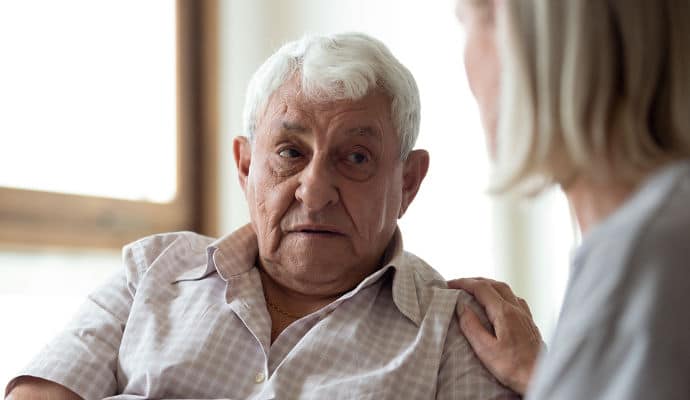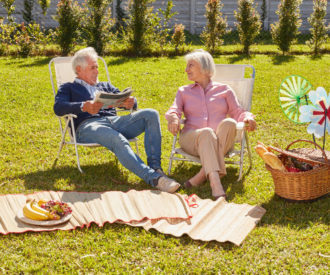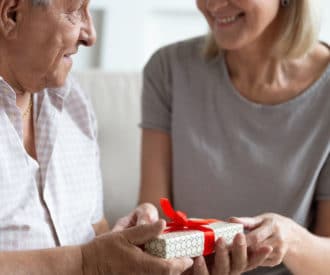
Updated 7/18/20
Americans stay home to slow the spread of infection
To slow the spread of the COVID-19 virus, millions of Americans have been asked to stay at home for protection and only go out for food or medicine, to provide care, or to exercise in their neighborhoods while staying 6 feet away from others.
Taking these actions will slow the infection rate and reduce the number of people who get sick at the same time (“flatten the curve”).
This keeps health care systems from getting overwhelmed and helps severely ill people get the specialized care they need.
To protect your older adult, yourself, and those in your community, focus on learning the facts and following the CDC’s recommended prevention tips.
Here, we’ve gathered the latest news and research so you can easily see everything you need to know about coronavirus, how it affects seniors, and how to protect against it.
To get answers to top questions from caregivers, refer to our article: Coronavirus Senior Care Q&A.
Jump directly to a specific section
Use these links to jump directly to the sections you’re most interested in. Or, keep scrolling to see all questions.
- Quick facts and prevention tips
- Where to get the latest updates
- What is coronavirus?
- How does it spread?
- Coronavirus prevention
- Coronavirus symptoms, severity, and death rate
- Seniors are at higher risk of complications and death
- Does the flu shot provide protection against coronavirus?
- Should I wear a face mask when I go out? What about at home? Updated 4/28
- Is there a coronavirus vaccine or treatment?
- Avoid these dangerous fake coronavirus “cures,” scams, and misinformation
- Top resources and latest news about coronavirus for seniors
- Resources for Alzheimer’s and dementia caregivers
Quick facts and prevention tips
Commonly known as “coronavirus,” the COVID-19 virus is a respiratory illness.
Currently, the risk of getting coronavirus in the U.S. is low.
But if the illness does spread, seniors and people with chronic health conditions are at higher risk, just as they are with seasonal flu.
To reduce the spread of disease, CDC recommends using common-sense prevention practices:
- Get a flu shot, if you haven't already
- Wash your hands often with soap and water for at least 20 seconds, especially after going to the bathroom; before eating; and after blowing your nose, coughing, or sneezing.
- Avoid touching your eyes, nose, and mouth with unwashed hands.
- Stay home when you are sick.
- Cover your cough or sneeze with a tissue, then throw the tissue in the trash.
For people at higher risk of getting very sick from COVID-19, the CDC recommends:
- Stocking up on supplies
- Taking everyday precautions to keep space between yourself and others
- In public, keep away from others who are sick, limit close contact, and wash hands often
- Avoid crowds as much as possible
- Avoid cruise travel and non-essential air travel
- During a COVID-19 outbreak in your community, stay home as much as possible to further reduce your risk of being exposed
NOTE: Dangerous fake cures and treatments, scams, and misinformation are spreading online and on social media. Jump to our Fake Cures section below to get the latest news and debunk dangerous false information.
Where to get the latest updates on coronavirus
The U.S. Centers for Disease Control (CDC) is monitoring the situation closely and is the best source of information about COVID-19 (coronavirus).
For the latest information and recommendations, visit the CDC’s Situation Summary page.
What is coronavirus or COVID-19?
Coronaviruses are a large family of viruses.
In general, human coronaviruses cause respiratory tract infections that range from the common cold to more serious illnesses like Severe Acute Respiratory Syndrome (SARS).
COVID-19 is the name for a new virus that’s been spreading across the globe since late December 2019. It hadn’t previously been seen in humans.
How does COVID-19 spread?
Similar to seasonal flu, COVID-19 is passed between people through coughing, sneezing, or close contact like touching or shaking hands.
It can also be transmitted by touching a surface with the virus on it and then touching the eyes, nose, or mouth without washing hands.
Just like the flu, the virus spreads easily, which makes it hard to contain.
And because the incubation period is between 2 and 14 days, people could be transmitting the disease while they have no symptoms.
Coronavirus prevention
To protect from coronavirus, the CDC recommends the same methods that you’d use to protect against the flu or other common respiratory diseases.
Preventive measures include:
- Getting a flu shot (if you haven’t already)
- Washing hands often with soap and water for at least 20 seconds, especially after going to the bathroom; before eating; and after blowing nose, coughing, or sneezing. If soap and water aren’t available, use an alcohol-based hand sanitizer.
- Avoiding touching eyes, nose, and mouth with unwashed hands.
- Avoiding close contact with people who are sick. Close contact is considered more than a few minutes within 6 feet of a sick person or direct contact like kissing or sharing utensils.
- Staying away from work, school or other people if you become sick with respiratory symptoms like fever and cough.
- Covering coughs or sneezes with a tissue, then immediately throwing the tissue in the trash.
- Cleaning and disinfecting frequently touched objects and surfaces like doorknobs, remote controls, phones, computers, and mobile devices.
Consider “social distancing” for those at higher risk
People who are over the age of 60, pregnant, or on medications that weaken the immune system are at higher risk of infection and complications of infection.
Someone who’s at higher-risk might want to consider “social distancing” as a preventive measure.
That means if there’s any reported risk of COVID-19 transmission in the local area, avoid large gatherings of people and public transportation (bus, subway, taxi, rideshare).
In addition, keep a safe distance from other people, approximately 6 feet.
Coronavirus symptoms, severity, and death rate
Patients with COVID-19 have symptoms that are similar to other respiratory illnesses like colds or flu.
Common symptoms include mild to severe symptoms of fever, cough, and shortness of breath that usually begin two to 14 days after exposure.
Less commonly, sore throat and diarrhea have been reported in some patients.
Many patients with severe complications from the virus develop pneumonia in both lungs.
Researchers currently think that about 1% of coronavirus cases will result in death. However, the fatality rate varies by age, with older adults with pre-existing conditions more likely to die.
Seniors are at higher risk of complications and death
Generally, with a respiratory illness like seasonal flu, older adults are at higher risk of infection and developing complications like pneumonia.
Coronavirus COVID-19, a respiratory illness, seems to be following the same pattern.
Seniors are more vulnerable because their immune systems are weaker due to age and often made worse by frailty or chronic illnesses like diabetes, chronic obstructive pulmonary disease (COPD), or heart disease. This reduces the body's ability to cope with and recover from illness.
And according to U.S. News & World Report, “about 80% of people who have died from the virus in China were over 60 years of age, China's National Health Commission has reported. Studies in The Lancet found an average age of 55 among Chinese citizens who've developed pneumonia as a result of coronavirus infection.”
This is similar to the pattern seen in seasonal flu. In most flu seasons, the majority of flu deaths happen in people 65 or older.
Does the flu shot provide protection against coronavirus?
First, let’s remember that it’s still flu season and that the flu is known to cause serious illness and complications in seniors. Getting the flu shot reduces flu risk and severity. Get more info about the benefits of the flu shot for seniors »
In terms of COVID-19, according to Nancy Messonnier, director of the CDC’s National Center for Respiratory Diseases, there’s no evidence that the flu shot or the pneumococcal vaccination will provide protection from the coronavirus.
But according to Dr. Trish Perl, an infectious disease specialist at the University of Texas Southwestern Medical Center, “it is possible that the coronavirus, by injuring lung cells, can make it easier for pneumonia to take hold in people who also get the flu or bacterial pneumonia.”
So, infectious disease specialists strongly recommend flu vaccination as a way to prepare for coronavirus.
For seniors, having both the flu shot and the pneumococcal vaccine can increase the chances of staying healthy.
Should I wear a face mask when I go out? What about at home?
Wearing a face mask in public
Yes, you should wear a homemade mask or cloth face covering when you are in public.
The CDC has learned that COVID-19 is more easily spread than they first thought.
That’s because a significant number of people with coronavirus have no symptoms (“asymptomatic”) and even people who later develop symptoms (“pre-symptomatic”) can transmit the virus to others before showing symptoms.
On April 3, the CDC issued these guidelines recommending that people wear cloth masks or face coverings in public. This is in addition to maintaining a 6 foot distance from other people, another essential step in slowing the spread of coronavirus.
They emphasize that people should wear homemade, non-medical masks because medical-grade surgical and N95 masks are in short supply and urgently needed by healthcare workers and first responders.
The New York Times reports, “As many as 25 percent of people infected with the new coronavirus may not show symptoms…a startlingly high number that complicates efforts to predict the pandemic’s course and strategies to mitigate its spread.”
And Dr. Robert Redfield, the CDC director, said, “This helps explain how rapidly this virus continues to spread across the country,”
Wearing a face mask at home
If you’re caring for an especially high-risk older adult, you might want to consider having anyone in close contact with them wear a mask (including you).
Wearing a mask around your older adult would likely reduce their risk of getting the virus from someone who is infected but has no symptoms.
Outside of personal care tasks, you may also want to keep a reasonable distance from them or reduce the amount of time you spend in close contact. That can help to further reduce exposure risk.
Of course, the most important thing is to continue practicing good hygiene to prevent the spread of disease, as recommended by the CDC.
How to make a DIY coronavirus face mask at home
Since the face mask guidelines are still changing, the CDC hasn’t issued official instructions on how to make a proper DIY face mask. If or when they do, we’ll update this information.
Any DIY mask won’t be medical grade, but they will reduce the risk of the wearer releasing droplets into the air as they speak, breathe, cough, or sneeze.
They also keep the wearer from touching their face without noticing
And in a pinch, any cloth covering is better than nothing – like tying a bandana or scarf on your face.
We found some reputable sources for instructions on how to make a DIY face mask:
- Video tutorial from Providence St. Joseph Health
- Providence St. Joseph Health’s written and illustrated instructions and mask template / pattern
- Deaconess Health Systems information and instructions and video tutorial
- N95 style written instructions with illustrations from the New York Times
- Pleated mask written instructions with illustrations from the New York Times
- Written instructions from Vanderbilt University Medical Center
Generally, organizations are recommending that DIY coronavirus masks be made from tightly woven, high-quality cotton material.
Here’s an article that compares how well various materials work in filtering out viruses. Based on this analysis, it seems that dish or tea towels in two layers are very effective.
Elastic is often recommended for the ear loops, but there are reports that it’s now in short supply. Making ties out of cloth will also work, as shown in some of the tutorials above.
Important: Use clean materials, clean hands, and a clean workspace. It might also be a good idea to properly launder your cloth mask before use to make sure that it’s clean – there’s a lot of handling as you make it.
Additional information about DIY face masks
These clothing designers tested fabrics and found that blue shop towels are less permeable than cotton. But this material won’t survive in the wash.
If you’re good at sewing, you might be able to figure out how to make a cotton mask with a pocket that allows you to add and remove a “filter insert” made from a shop towel type of material.
Next Avenue also has a helpful article with information and advice for home sewers who wish to help healthcare workers by donating homemade masks.
There’s also an ongoing debate on the ideal mask pattern and fabric. Find out more in this Washington Post article.
Is there a coronavirus vaccine or treatment?
Currently, there is no vaccine or cure for coronavirus.
But scientists and pharmaceutical companies are hard at work on a vaccine. Some trials are scheduled to start as early as April.
And the World Health Organization's director-general said that “more than 20 potential vaccines aimed at preventing coronavirus disease are in development around the world.”
Plus, treatments to help patients heal or to relieve symptoms are already in clinical trials. Currently, researchers are focused on testing the existing antiviral drug remdesivir and a combination of HIV and flu drugs.
Avoid dangerous fake coronavirus “cures,” scams, and misinformation
IMPORTANT: DON’T attempt any coronavirus cures or treatments without first speaking with a qualified, reputable medical professional – preferably your regular doctor.
Be aware and avoid fake products that claim to cure coronavirus.
Scammers and thieves take advantage of public fear and confusion to sell fake medications, supplements, or treatments – especially on the internet and through social media.
Similarly, rumors and misinformation about supposed “cures” or “preventive measures” have been spreading like wildfire on the internet and social media.
Popular coronavirus scams include:
- Free store gift cards as COVID-19 stimulus packages in exchange for filling out a customer survey or registration
- Get free iPhones by clicking a link in a text message – loads malware that spies on you
- Counterfeit face masks and hand sanitizer
- Fraudulent home test kits for coronavirus
- Undelivered goods from fake sellers – they promise to sell you a sold out product like face masks, take your money, and don’t deliver anything
- Emails, texts, apps, or websites that claim to track the spread of the virus, but get you to download ransomware onto your device that blocks your access and holds your phone or computer for ransom
- Fake supplements, lotions, toothpastes, teas, etc. that claim to cure or treat coronavirus
- Religious or faith-based miracle cures
- CBD-based cures and treatments
- Fake charity organizations
- Robocalls pitching a variety of scams
- Fake payday loans
- Fake work-from-home schemes
Top news stories that keep us informed about coronavirus scams and rumors of fake cures:
- COVID-19 scams target bank accounts, stimulus checks, puppies – USA Today, 5/17/20
- As ‘#Plandemic' goes viral, those targeted by discredited scientist's crusade warn of ‘dangerous' claims – NBC News, 5/7/20
- Avoid Coronavirus Scams – FTC tips on how to protect yourself from scams
- Herbs. Silver. Salt. Toothpaste. As coronavirus fears rise, marketers pitch remedies – Washington Post, 4/1/20
- Man Fatally Poisons Himself While Self-Medicating for Coronavirus, Doctor Says – New York Times, 3/24/20
- FTC & FDA: Warnings sent to sellers of scam Coronavirus treatments (lists 7 specific sellers of fraudulent products) – U.S. Federal Trade Commission, 3/9/20
- FTC: Coronavirus scams, Part 2 – U.S. Federal Trade Commission, 3/19/20
- COVID-19 Scams Are Everywhere Right Now. Here's How to Protect Yourself – Time, 3/19/20
- Coronavirus Scams: Watch Out For These Efforts To Exploit The Pandemic – Forbes, 3/19/20
- US authorities battle surge in coronavirus scams, from phishing to fake treatments – The Guardian, 3/19/20
- Missouri Sues Televangelist Jim Bakker For Selling Fake Coronavirus Cure – CBS News, 3/12/20
- Alex Jones accused of selling fake coronavirus cures – Chicago Sun-Times, 3/12/20
- Coronavirus cannot be cured by drinking bleach or snorting cocaine, despite social media rumors – CBS News, 3/9/20
Top resources and latest news about coronavirus for seniors
Early Herd Immunity against COVID-19: A Dangerous Misconception – Johns Hopkins University of Medicine
“As infectious disease epidemiologists, we wish to state clearly that herd immunity against COVID-19 will not be achieved at a population level in 2020, barring a public health catastrophe.
…Some have entertained the idea of “controlled voluntary infection,” akin to the “chickenpox parties” of the 1980s. However, COVID-19 is 100 times more lethal than the chickenpox.”
Putting the Risk of Covid-19 in Perspective – New York Times, updated 5/27/20
How dangerous is it to live in New York City during this pandemic? How much safer is it in other places? Is the risk of dying from Covid-19 comparable to driving to work every day, skydiving or being a soldier in a war?
We are awash in statistics about Covid-19: number of deaths, fatality rates, contagion rates. But what does this all mean in terms of personal risk?
Latest Updates on Coronavirus: Older Americans Urged to Continue ‘Distancing’ – AARP, updated 5/29/20
“Older adults and people with underlying health conditions are encouraged to stay home as much as possible and to keep a distance of at least 6 feet from others, even as communities around the country begin to relax restrictions put in place to slow the spread of the coronavirus. This advice carries through the first two phases of reopening guidelines drafted by the White House coronavirus task force.
And while limiting contact with others is one way to slow the spread of the virus and protect high-risk populations from infection, public health experts also are advising everyday actions that can reduce risk of infection, such as frequent handwashing and disinfecting high-touch surfaces. This includes tables, doorknobs, light switches, countertops, handles, desks, phones, keyboards, toilets, faucets and sinks.”
Tracking Covid-19 cases in the US – CNN Health, updated 6/1/20
These charts are based on data from the Johns Hopkins University Center for Systems Science and Engineering and the numbers are updated every 15 minutes.
A Guide to Staying Safe as States Reopen – The Atlantic, 5/7/20
Can I eat at a restaurant? Can I go shopping? Can I hug my friends again? Experts weigh in.
How the coronavirus goes from mild to deadly in 7 steps – Business Insider, 5/21/20
Recent studies outlined a step-by-step path for how the coronavirus kills patients. This is important to know because once a cytokine storm starts, the chances of survival go down.
So, knowing who is more susceptible to this reaction and when to block that cytokine storm is critical to reducing the death rate among coronavirus patients.
As States Consider Allowing Nursing Home Visitors, CMS Urges ‘Extreme Caution' – AARP, 5/19/20
“As states begin to lift coronavirus stay-at-home orders, the federal government is asking governors to “proceed with extreme caution” before allowing visitors into the long-term care facilities that are home to the nation's most vulnerable citizens and have become ground zero for the pandemic.
Nursing homes should be “among the last to reopen” in a community where restrictions are being lifted for businesses and other activities, officials from the Centers for Medicare & Medicaid Services (CMS) said Monday in announcing recommendations to state and local governments.”
People mostly staying home are still getting Covid-19—here’s the problem and what to do about it – CNBC, 5/15/20
“In a press conference May 6, Gov. Andrew Cuomo said that 66% of new hospitalizations in New York for Covid-19 were people who had been staying home.
…It’s possible that as we enter the ninth and tenth week of fairly extreme prevention measures, people are feeling fatigued or getting too relaxed, says Joseph Vinetz, professor of medicine at the Yale School of Medicine and physician scientist in infectious diseases.
“Just because we’re tired doesn’t mean that the virus cares,” he says. ‘Viruses have no emotions; they just do their thing.’
According to Cuomo, “much of this comes down to what you do to protect yourself.’”
A Physician Answers 5 Questions About Asymptomatic COVID-19 – Next Avenue, 5/8/20
People without symptoms transmitting the virus are a major reason behind the rapid spread of COVID-19.
“Dr. William Petri is a professor of medicine and microbiology at the University of Virginia who specializes in infectious diseases. Here, he runs through what’s known and what isn’t about asymptomatic cases of COVID-19.”
A User’s Guide to Face Masks – New York Times, updated 5/6/20
“By now you’ve figured out that wearing a mask is not as simple as all those TV doctors made it look. Here’s our guide to the wear and care of your new mask.”
Coping with Coronavirus Stress – Psychology Today, 3/16/20
“Here are four strategies to help you maintain your mental wellness during the COVID-19 pandemic.”
Sick at home with COVID-19: How to care for your loved ones infected with coronavirus – USA Today, 4/16/20
“Those who are infected and don’t require hospitalization are instructed to stay home, but that still leaves families and roommates vulnerable.
So, what can one do to keep loved ones safe while recovering at home from COVID-19? And what can caregivers do to stay healthy?”
Emotional Well-Being and Coping During COVID-19 – University of California, San Francisco
Doctors and experts at the UCSF Weill Institute for Neurosciences put together this comprehensive guide on how to improve well-being by managing the anxiety and stress that the coronavirus pandemic is causing.
What You Can Do About Coronavirus Right Now – New York Times, updated 4/11/20
Tara Parker-Pope, founding editor of The Times's award-winning consumer health site, writes “You have an essential role to play in slowing the spread of the new coronavirus.
The good news is that small changes in personal behavior can buy time – slowing the outbreak, preventing hospitals from becoming overwhelmed and reducing cases until scientists develop treatments and, eventually, a vaccine.
Here’s some practical advice from doctors and public health experts to protect yourself and your community.”
Coronavirus Anxiety: Coping with Stress, Fear, and Uncertainty – HelpGuide
Fears about COVID-19 can take an emotional toll, especially if you’re already in a stressful situation. These tips can help.
Q&A: How to care for the elderly without putting them at risk of coronavirus – STAT, 3/12/20
In this article, STAT spoke with Charlotte Yeh, chief medical officer at AARP, to find out how to stay in touch with and care for older adults without putting them at risk of exposure to Covid-19. The discussion covers important questions like:
- Should people consider taking their elderly out of long-term care facilities?
- How can people stay connected with their elderly family members during a time of restrictions on visits?
- How can the elderly stay active inside their home and keep themselves entertained?
Resources for Alzheimer’s and dementia caregivers
Teepa Snow’s How to talk to your family member who is locked in AND living with dementia – 3/20/20
If your older adult has Alzheimer’s or dementia, this video will help you answer their questions and get cooperation about the major changes in routine while minimizing distress or arguments.
From the beginning to 10 min 5 sec in the video: Watch Corrie (mom) and Beth (daughter) struggle through the “normal” conversation that is happening with COVID-19 quarantine and lock-downs.
Starting at 10 min 5 sec: Teepa offers insight and the Positive Approach and Beth and Corrie demonstrate how things could be different for all involved.
Alzheimer’s Foundation of America Helpline
The Alzheimer’s Foundation of America’s Helpline is open 7 days a week to provide guidance and information about coronavirus prevention tips, handling isolation, and caring for their loved ones. The web and text chat features are available in more than 90 languages.
Families can connect with the AFA Helpline:
- Via phone by calling 866-232-8484
- Web chat by visiting alzfdn.org and clicking on the blue and white chat icon on the lower right hand corner of the page
- Sending a text message to 646-586-5283
Alzheimer’s Association's COVID-19, Alzheimer’s and Dementia: What You Need to Know
Alzheimer’s Association keeps you updated with 24/7 support, resources, and tips about the coronavirus (COVID-19) pandemic for people living with dementia, caregivers, and families.
Alzheimer’s Association’s Coronavirus (COVID-19): Tips for Dementia Caregivers
“Most likely, dementia does not increase risk for COVID-19, the respiratory illness caused by the new coronavirus, just like dementia does not increase risk for flu. However, dementia-related behaviors, increased age and common health conditions that often accompany dementia may increase risk.
For example, people with Alzheimer's disease and all other dementia may forget to wash their hands or take other recommended precautions to prevent illness. In addition, diseases like COVID-19 and the flu may worsen cognitive impairment due to dementia.”
Find out about:
- Tips for dementia caregivers at home
- Staying healthy
- Tips for caregivers of individuals in assisted living
Recommended for you:
- All coronavirus articles
- Coronavirus Senior Care: Answers to Top Caregiver Questions
- 8 Shelter-in-Place Coronavirus Tips for Senior Care in Your Home
By DailyCaring Editorial Team
This article wasn’t sponsored and doesn’t contain affiliate links. For more information, see How We Make Money.
[optin-monster slug=”yxbytm35zhsdfopnw7qk”][optin-monster slug=”jvhyplxmb4umsjazxecn”]
About the Author

Connie Chow
Connie was a hands-on caregiver for her grandmother for 20 years. (Grandma made it to 101 years old!) She knows how challenging, overwhelming, and all-consuming caring for an older adult can be. She also knows how important support is — especially in the form of practical solutions, valuable resources, and self-care tips.




